* As promised, here are some of the results from a statewide poll conducted for the Illinois Policy Institute by Doug Schoen. The full poll can be read by clicking here. Graphic image results, which was what the IPI sent to inquiring reporters yesterday, can be viewed by clicking here.
The universe is small, just 400 registered voters. It was taken August 29 through September 5th. There are no available crosstabs. They did provide some demographics, however, including 42 percent Democrats, 24 percent Republicans and 26 percent independents. That’s about right. 19 percent said they belonged to a union, and 61 percent of those said they belonged to a “public union.”
* Right off the bat, you can see that Illinoisans have no illusions about how well their government runs…
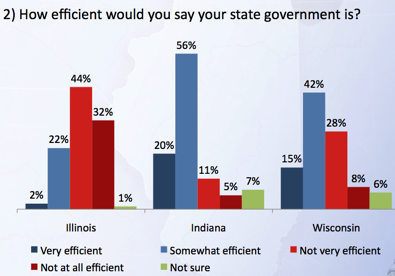
Wisconsin and Indiana residents are obviously more pleased with their state governance.
From the full results, they have the state’s right economic track at 23 percent and wrong track at 74 percent.
* As you might expect, considering the source, much of the poll is aimed at state workers and unions. But Illinoisans are not reflexively anti-public worker. For instance a strong plurality say that public worker salaries are either too low or about right…
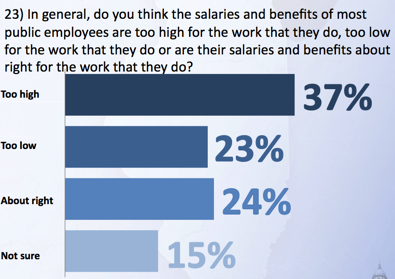
* The IPI skipped over some questions in its graphic presentation that it sent to reporters. The full report has those questions. For instance, 56 percent say public employee retirees should not have to “contribute more toward pension and healthcare benefits because of state and local government budget problems.” The public is also divided over the question of whether public employees are paying their fair share toward retirement costs, with 38 percent saying they are paying their fair share and 36 percent saying they aren’t.
* And while there is some support for collective bargaining “reform,” a 53 percent majority opposes restricting collective bargaining rights. The public also doesn’t think that this reform will make much difference…
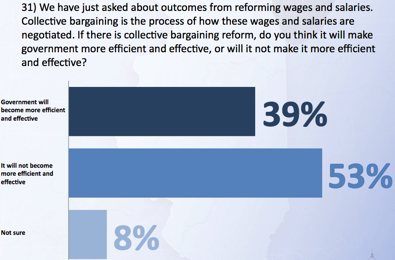
Also…
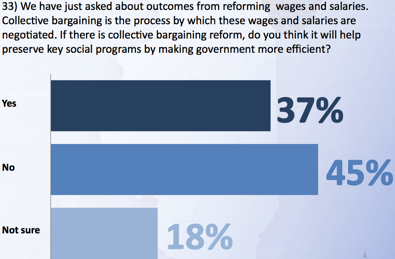
* Since the Statehouse receives middling coverage around Illinois, most legislators have grown accustomed to operating without much public knowledge. However, the public is obviously keeping track of the budget crisis…
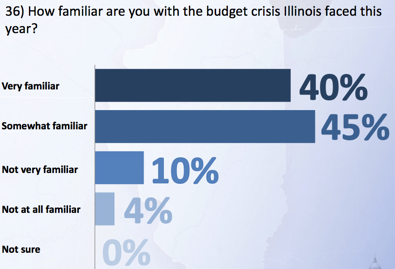
* It’s no surprise that the IPI would ask loaded questions in its poll. It is what it is. However, it’s even worse when they cross the line into deliberate falsehoods…
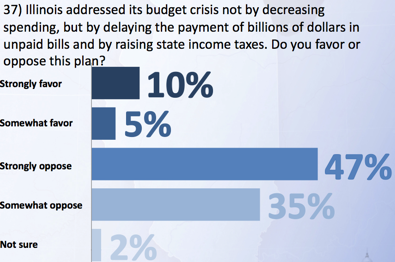
The public has a different view about how the problem was solved, however…
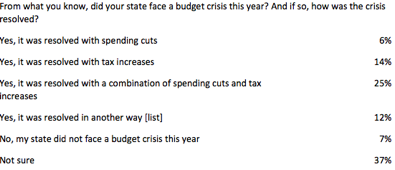
* Once again, back to public employees…
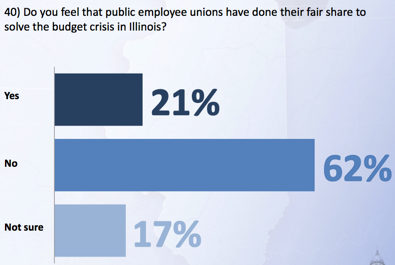
* According to the poll 70 percent had [not] heard about the lawsuit between AFSCME and the state. The lawsuit was not described, but those who said they had heard of it were then asked which side they backed. This will give you a good idea of how much contempt voters have for the state. Even though respondents believe that the union is not doing enough to help with the state’s problems, a clear plurality sides with the union over the state…
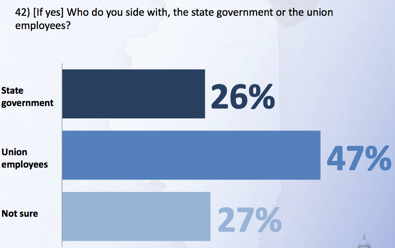
However, when the lawsuit is explained in the next question, 63 percent said the union should have to accept a pay freeze, while just 27 percent said the union should get its guaranteed pay increase.
* This is one of two biggest surprises in the poll results. 32 percent actually favor the tax hike? I never would’ve thought it was that high…
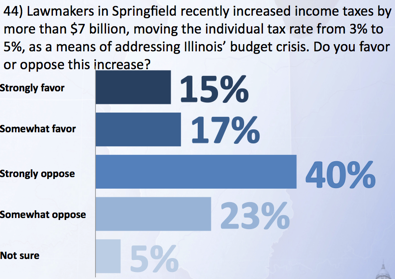
* This is little surprise…
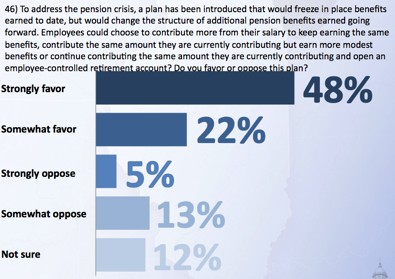
* Here’s the other, perhaps bigger surprise. Even though a clear majority favors pension changes, few actually say it would move their votes, and only by a paltry net of ten percent…
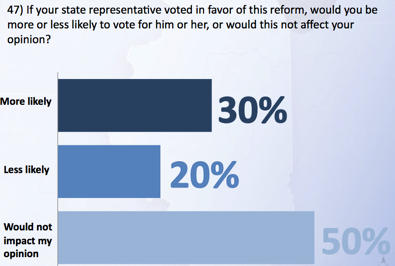
If that result is accurate, and the universe is quite small so I can’t say it is, then there’s no good political reason to go against the unions on this issue. Legislators might have a fiduciary reason for doing so, but the political benefit could be slight to nil. Then again, control of the House and Senate is decided in districts that are more independent-leaning, so the numbers could be stronger there.
Discuss.
30 Comments  
|
* Laws like this one, which give some union leaders huge city pensions for city jobs that they left years ago, are a big reason why the General Assembly stopped routinely using conference committee reports a long time ago…
Because the law bases the city pensions on the labor leaders’ union salaries, they are reaping retirement benefits that far outstrip the modest salaries they made as city employees. On average, their pensions are nearly three times higher than what the typical retired city worker receives. […]
In April 1990, then-Sen. Emil Jones presented a bill aimed at increasing pension benefits for city employees in the municipal pension fund. Other members of the Senate and the House also added provisions before the bill passed both chambers by the summer.
The bill didn’t include the perk for labor leaders at that point, records show. But because the versions passed by the two chambers differed slightly, each chamber appointed five members to a conference committee to iron out the differences.
Although the 10 lawmakers were supposed to reach a compromise on what had passed already, during their meetings more than 100 provisions were added to the bill. The new, much larger bill included the pension deal for labor leaders.
“These provisions incorporated within this bill have been agreed to by the (city) administration and the pension system and the laborers,” Jones told his Senate colleagues the day the bill passed in January 1991. “The people in the city of Chicago came together and agreed.”
The conference committee report obviously became a grotesque pension Christmas tree. I seriously doubt that anybody knew and understood all the provisions of the bill, or even most of them. And I’ll bet it got almost no debate.
Conference committees were a joke. The committees rarely if ever met. And since we’d see so many of them near the end of session, nobody could keep track of what was in the things, so somebody was always trying to sneak something through. And those folks usually succeeded. I wrote a story years ago about an attempt by AT&T to deregulate the telephone industry via one line buried deep within a big conference committee report. The report actually passed one chamber before it was finally halted.
While still legal, they are rarely used now, and that’s a good thing.
The other difference between now and then was nobody really gave a fig about the consequences of pension proposals like this one. Legislators just couldn’t, didn’t, or wouldn’t imagine the enormity of the problem they were creating. They also didn’t care. Most also probably figured that if things did get bad they’d be long gone. They were right about that. Only a tiny handful of legislators who were here in 1990 are still around today.
With all of our problems, the House and Senate are much better run institutions now than they were in the past.
*** UPDATE *** The mess is even worse than I thought. This bill was passed on the last day of a lame duck legislative session on the same day that 15 other conference committee reports passed. Jim Thompson signed the bill into law the morning before Jim Edgar was sworn in as governor. The Christmas tree was also apparently passed to get the Senate Republicans to support funding for a Chicago teacher pay raise.
Also, this is from the Trib story…
None of these pension deals could happen without the blessing of city government, which has granted lengthy leaves of absence to union officials. The average leave of absence for city employees who are on a leave to work for a union is nearly eight years. Roughly a third have been on leave for more than 12 years.
None of this could’ve happened without the city. The city didn’t have to agree to these pension deals, but it did. The city is really to blame here.
*** UPDATE 2 *** From Illinois Issues’ February, 1991 issue…
The heaviest piece of work that lawmakers tackled was a 252-page omnibus pension bill. Sponsors had tried and failed to get agreement on the bill during the spring session and again in November. The measure increased benefits to workers covered by 14 public pension systems. The new legislation increased the liabilities of the systems by nearly $300 million will raise the annual costs to those systems by more than $35 million. Most of those costs are for Chicago systems. For the five statewide systems the increase in liabilities is about $15 million, and the increased annual cost totals about $1.5 million.
The largest costs will be borne by Chicago pension systems and were approved after Chicago, the pension systems and workers agreed to the changes. There are increases for others, too. Retired downstate teachers saw an increase from 50 percent to 75 percent in the pension system’s share of their health insurance costs.
The bill also contained a not-so-new element, as lawmakers repassed the pension funding swap that they had voted in June and November, which allowed the Chicago Board of Education to pay negotiated salary increases to its teachers. The plan to tap two existing property tax sources - $51 million used for pension payments and $15 million that would go to the building fund - had gotten only a majority vote approval in November. Questions over whether the measure should have required a three-fifths vote had opened the door to legal action. By repassing the measure after January 1, when a simple majority vote was needed, lawmakers foreclosed such a challenge.
Inclusion of the once controversial pension swap prompted some Senate opposition to the omnibus bill. Republican senators had twice rallied against the pension swap, saying it would create future problems. Sen. Calvin W. Schuneman (R-37, Prophetstown) cautioned that the pension swap was not agreed to by all parties, as was everything else in the package. “Most of the provisions that are in this bill are Chicago pension sweeteners, and there really isn’t very much in this bill for downstate interests,” Schuneman said. Despite his effort, the measure picked up Republican support and got 37 Senate votes. The measure got 99 votes in the House.
[ *** End Of Updates *** ]
* Meanwhile, one of the things I noticed in yesterday’s Tribune story about Senate President John Cullerton and the gaming bill was that there was no direct quote on this particular topic…
The North Side Democrat also said he’s willing to scrap plans for year-round horse racing with slot machines at the state fairgrounds in Springfield.
* The Trib didn’t post the audio of the interview, so there’s no real way of knowing exactly what was said, but the comment caused some consternation among Springfield legislators…
State Rep. Raymond Poe, R-Springfield, who has urged that harness racing, along with slot machines, be allowed at the fairgrounds for nine months of the year, said he will vote against any compromise that takes the fairgrounds out of the mix. State fair patrons already can bet on harness races during the fair itself.
After expenses, 50 percent of revenue from harness racing and slot machines at the fairgrounds would go to improve the site’s infrastructure. The other half would bolster county fairs and Future Farmers of America and 4-H programs. […]
State Sen. Larry Bomke, R-Springfield, said he also was disappointed to hear talk that the fairgrounds could be left out of the gambling bill. Bomke noted that the bill, which provides for new casinos in Chicago, Danville, Park City, Rockford and the south suburbs of Cook County, also provides funding for soil and water conservation districts, historic sites and state parks.
If money for those items is deleted along with funds for county fairs and agriculture education programs, “that doesn’t leave much for a downstater to support,” Bomke said.
* Cullerton’s spokesperson clarified her boss’ remarks via e-mail…
He supported the state fairgrounds provision in the gaming bill and voted for it.
However, he is open to reconsidering that component of the bill if it addresses some of the Governor’s concerns.
If they dump that State Fair provision, they’ll have to find more votes in both chambers to pass another bill. That’s not going to be easy, to say the least.
This gaming proposal is not a pretty bill by any means. But the provisions are pretty carefully balanced to achieve the goal of passage. Most of the complaints about oversight and regulation can be dealt with without hurting the bottom line of 60 votes in the House and 30 in the Senate, but they won’t be able to take too much out of this bill before the whole thing falls apart like a house of cards. There’s a reason why it’s taken decades to pass a bill to approve new casinos. It’s extremely hard to do.
29 Comments  
|
Question of the day
Wednesday, Sep 21, 2011 - Posted by Rich Miller
* Former Sen. Chuck Percy passed away over the weekend. I thought you might like a chance to talk about your memories of the late, great Senator. So, have at it.
32 Comments  
|
* Freshman Congressman Joe Walsh just announced that he will run in the 14th District primary. From his press release…
As you know, the Democrats controlled the entire redistricting process in Illinois and they’ve drawn a map which attempts to overturn the 2010 election. The Republicans have filed suit to challenge the Democrat drawn map and have presented the court with their own fair map. We should get an answer from the Court in November but I didn’t want to wait that long to let you all know what I’ll be doing.
* Walsh mentions fellow freshman Randy Hultgren in the announcement…
I understand that there is another Republican Congressman drawn into this new district, Randy Hultgren and it would be unfortunate if we had to run against each other. But the new 14th District, if it stands, doesn’t belong to any Incumbent or any politician. The district belongs to the people of this district and they will have to decide who their next representative is. And if they have to decide between two Republican Incumbents, so be it - in many ways Randy and I are both good conservatives who share many of the same values but there are also healthy differences between the two of us, we’ve both had a very different initial tenure in Washington, and the voters in the new district will decide which one of us will best be their voice in DC.
* And he has already begun framing the primary race against Hultgren, who was a state legislator before moving to Congress…
I said during the campaign I was going to go to Washington and scream from the mountaintop about the frightening direction our country was heading and that’s what I’ve done, becoming one of the most outspoken voices in Congress.
Friends, we’re in a fight, a fight we can’t lose. This President doesn’t understand what makes America great. His policies are destroying what makes this the greatest and freest country in the history of this planet, and the only way we will defeat him and those who agree with him is to respectfully fight him with everything we’ve got. Now is not the time to have career politicians in Washington who will just get along, compromise too much, and do what their party leadership tells them to do. We need members of Congress right now who will fight for the folks back home, do what’s right, and not worry about the next election.
I went to Washington because I believe America is going through a revolution over her very soul and I wanted to do my part to help win this fight. It’s why I’ve been so vocal this first year, it’s why I’ve been a leader in the fight for the balanced budget amendment, it’s why I was one of 22 Republicans who voted against my own Speaker’s final debt ceiling compromise, it’s why I sleep in my office, why I’ve limited myself to no more than six years in Congress, it’s why I turned down my Congressional health and retirement benefits, and it’s why I did not attend President Obama’s joint session speech the other week and instead came home and listened to 100 small business owners, the real job creators in this country. We are at a crucial point in our country’s history and our side — the side that believes in freedom and limited government — has to win. […]
I said during the Campaign that I am a tea party conservative first, and a Republican second. You see, I believe the tea party movement is bigger than either party — it consists of every American frustrated, concerned, angry and scared with how big government is getting and the debt we’re placing on ourselves and future generations. This “silent majority” has put their faith in the Republican Party one last time to get it right.
* As I told you yesterday, Republicans have been holding back on making campaign announcements until their map lawsuit is resolved. Walsh is the second member, after Tim Johnson, to declare his intentions. The dam may be about to burst, but this story may also have played a role in Walsh’s timing…
Nineteen lawmakers are listed as either violating the law or showing a lack of regard for congressional ethics and rules in a government watchdog group’s annual report on the “Most Corrupt” members of Congress.
The seventh annual report released Tuesday by Citizens for Responsibility and Ethics in Washington (CREW) lists 14 members — 10 Republicans and 4 Democrats — as having allegedly violated congressional ethics rules or criminal laws, such as illegally garnering campaign contributions or failing to disclose accurate financial records. […]
Of the 19 lawmakers listed in the report, six of those are freshmen, including [Joe Walsh]. The report states that Walsh allegedly made inaccurate statements on his financial disclosure forms and court financial filing records. Walsh owes his ex-wife more than $100,000 in child support payments, and the report argues that it does not reflect creditably on the House, especially while he was able to loan $35,500 to his campaign committee.
A county judge in Illinois ruled last week that Walsh has to explain why he is so far behind making his child support payments, according to the Chicago Sun-Times.
Regardless of what some feel about CREW, its report will make a heckuva mailer.
*** UPDATE 1 *** Congressman Hultgren responds, claiming Walsh is playing into the Democrats’ hands by announcing so soon and tossing in a few other insults for good measure…
“I’m disappointed that the Congressman from the 8th District has decided to abandon his own district to run against me in a primary,” said US Rep. Randy Hultgren (IL-14). “By doing so, he’s playing into the hands of the Springfield Democrats and Nancy Pelosi, who have drawn the Congressional map for Illinois specifically to encourage just such a contest.
“The residents of the 14th District are looking for responsible leadership for the long haul, and know that if we are to turn this country around, fix our economy, and put Americans back to work we won’t be able to do it through political grandstanding, sound bites, and name calling. Winning the challenge before us takes commitment, experience, and a long term view.
“Throughout the campaign I look forward to proving my pro-business, small-government, pro-freedom record and earning the support of the voters of the 14th District so I can continue to represent them in Washington for years to come.”
Thoughts?
*** UPDATE 2 *** A silly press release from Democrat Tammy Duckworth’s campaign…
“Faced with running against Tammy Duckworth, Joe Walsh cut and ran. She leads the Democratic primary 69-8%, won in the 8th district before, and raised $4.5 million in 2006. But more than that, Tammy Duckworth has a story of service to our nation and standing up for middle-class families like the one she grew up in that Joe Walsh could never challenge. There are rumors that GOP sources polled Walsh against Tammy. We don’t know the results of the poll, but his retreat makes it clear what the voters told Joe Walsh — pack your bags,” said Josh Levin, Campaign Manager
Walsh was never going to stay in that district.
*** UPDATE 3 *** The National Journal is usually the DC bible, but this is wrong, or at least badly outdated…
Walsh will have one ally on his side in the GOP race - the anti-tax Club for Growth. Nearly two months ago, the conservative group signaled they would back Walsh if he ran in the 14th District.
Yeah, the Club for Growth did come out for Walsh in July. But after the Sun-Times broke the child support story in August, the Club for Growth backed off…
Club for Growth President Chris Chocola told The Hill that if the reports were true, they might not support him after all.
“We said that if he ran in the 14th then we would likely endorse him. But character matters. If these are real issues, we don’t know what the answer is. He has said this isn’t true, but when it comes time to make a decision, character matters,” Chocola said on Tuesday. “Walsh has been a leader on the issues, and when you look strictly at his votes and at his policy positions he’s great. But character matters and we’ll learn what the facts are on him.”
49 Comments  
|
Zagel’s big decision
Wednesday, Sep 21, 2011 - Posted by Rich Miller
* This is, almost without a doubt, the most important ruling that Judge Zagel will make in Bill Cellini’s upcoming trial…
Federal prosecutors on Tuesday asked a judge in an upcoming corruption trial to block “irrelevant” questions about the personal life of the expected star witness: serial swindler Stuart Levine.
Prosecutors say defense lawyers for Springfield power broker William Cellini, a onetime co-defendant of former Gov. Rod Blagojevich, should not be allowed to delve into Levine’s lurid background, including Levine’s previous testimony that he’d engage in all-night, drug-fueled parties at the Purple Hotel in Lincolnwood and then attend a meeting for a state board the following day. […]
By limiting Levine’s cross examination, the government is trying to avoid the same 15-day saga that played out in Tony Rezko’s 2008 corruption trial, where Levine, once a GOP supporter and the member of two influential state boards, spelled out many details of his personal life, arguably creating a distraction in the trial.
“The government anticipates that the defendant will attempt to introduce evidence or cross-examine Stuart Levine, a potential government witness, on certain matters that are irrelevant and/or unduly prejudicial, such as on matters pertaining to Levine’s drug use and personal life,” prosecutors wrote in Tuesday’s filing. Some of those papers were filed in private with the judge at the government’s request.
Tony Rezko’s attorneys were able to bring up much (but not all) of Levine’s past, which included seemingly constant cocaine use and drug-filled parties with young men in the Chicago area and, on at least one occasion, Springfield.
Rezko’s defense was, essentially, that Levine had made the whole thing up. There was no attempt to shake down investor Thomas Rosenberg for a $1.5 million campaign contribution because the plan never existed, except in Levine’s drug-addled mind. The jury agreed. Rezko was acquitted of these Levine-related charges.
Judge Zagel disallowed this particular line of questioning in the Blagojevich trial, but Levine was never called to the stand. The alleged shakedown attempt wasn’t part of that trial.
* If the proseuction wins on this point, Levine’s testimony will be almost golden. If Cellini’s lawyers win the round, then Levine will once again be forced to reveal his lurid past and the prosecution will be at a distinct disadvantage. Keep in mind that the prosecution’s entire case against Cellini is built on this alleged shakedown attempt and that Rosenburg has already testified that Cellini never asked him for a dime. If the shakedown scheme is seriously undermined once again, then Cellini may have a decent chance at winning here.
The rest of the Cellini legend will be a factor, of course, but the centrality of the case is this alleged shakedown, which was already found once to be a fantasy.
* Read the prosecution’s filing by clicking here.
13 Comments  
|
|
Comments Off  
|
|
Comments Off  
|
|
 Support CapitolFax.com
Support CapitolFax.com
Visit our advertisers...
  ...............
...............
 ...............
...............
 ...............
...............
 ...............
...............
 ...............
...............
 ...............
...............
 ...............
...............
 ...............
...............


|
   
|
Hosted by MCS |
SUBSCRIBE to Capitol Fax |
Advertise Here |
Mobile Version |
Contact Rich Miller
|






























